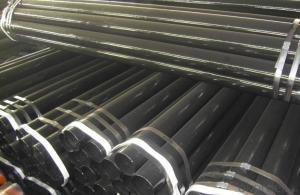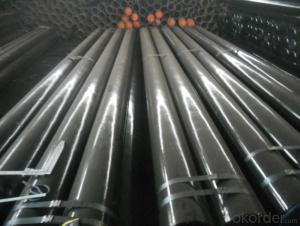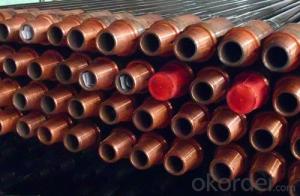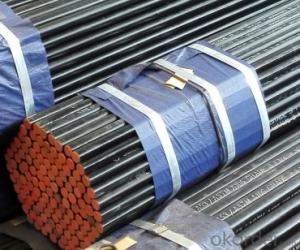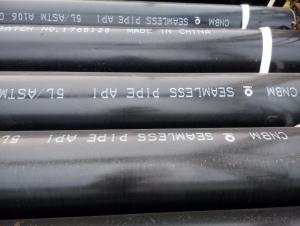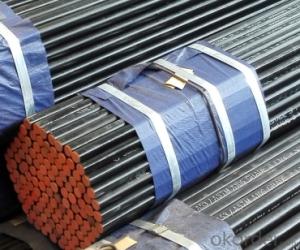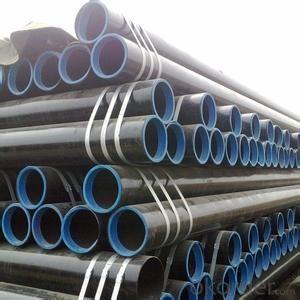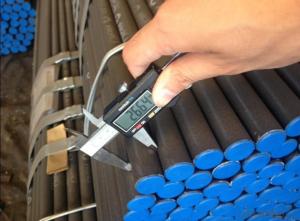Seamless steel pipe API 5L/ASTM A 106/ASTM A53GR.B
- Loading Port:
- Tianjin
- Payment Terms:
- TT or LC
- Min Order Qty:
- 10 m.t.
- Supply Capability:
- 5000 m.t./month
OKorder Service Pledge
OKorder Financial Service
You Might Also Like
Seamless pipe possesses a hollow section and without seam around the strip steel. It is produced with solid bar or steel ingot by perforating machine. Since the facture process does not include any welding, seamless pipes are stronger and more durable the welding pipes. We believe that seamless pipe has better pressure resistance and security than other classifications, and was usually more easily available than welded pipe.
2、Main Features of the Seamless Pipe:
• High working accuracy
• High strength
• Small inertia resistance
• Strong therming dissipine ability
• Good appearance
• Reasonble price
3、Seamless Pipe Specification:
Standard | GB, DIN, ASTM ASTM A106-2006, ASTM A53-2007 |
Grade | 10#-45#, 16Mn 10#, 20#, 45#, 16Mn |
Thickness | 8 - 33 mm |
Section Shape | Round |
Outer Diameter | 133 - 219 mm |
Place of Origin | Shandong, China (Mainland) |
Secondary Or Not | Non-secondary |
Application | Hydraulic Pipe |
Technique | Cold Drawn |
Certification | API |
Surface Treatment | factory state or painted black |
Special Pipe | API Pipe |
Alloy Or Not | Non-alloy |
Length | 5-12M |
Outer Diameter | 21.3-610mm |
Grade | 20#, 45#, Q345, API J55, API K55, API L80, API N80, API P110, A53B |
Standard | ASME, ASTM |
1) Material:20#(ASTM A 106/A53 GRB.API5LGRB,GB),45#,16Mn,10#.
2) Specification range: OD: 21.3-610mm, WT:6-70mm, length:6-12m or according to the requirement of clients.
3) Executive standards: GB, ASME API5L.ASTM A 106/A53,Despite of the above standards, we can also supply seamless steel pipe with standard of DIN, JIS, and so on, and also develop new products according to the requirements of our clients!
4) Surface: black lacquered, varnish coating or galvanized.
5) Ends: Beveled or square cut, plastic capped, painted.
6) Packing: bundles wrapped with strong steel strip, seaworthy packing.
4、Packaging & Delivery:
Packaging Details: | seaworthy package, bundles wrapped with strong steel strip |
Delivery Detail: | 15-30days after received 30%TT |
5、FAQ of Seamless Pipe:
①How is the quality of your products?
Our products are strictly in accordance with international and domestic standard. Every pipe will be tested before delivery. Any quality certification or testing report you want to see, please tell us.
You get our promise: If products’ quality is not in accordance with the promise before you place order, we promise 100% refund.
②How about the price?
Yes, we are factory and can give you the lowest price. “ to save time and be absolutely honest with our business relationship, we quote as low as possible for every client, and discount can be given according to the quantity” is one of our policy, if you are in favor of bargain and dissatisfy our factory price, just don’t waste your time. Our quotation is great.
③Why should you choose us?
Choice happens since our quality and price. Additionally, we can also offer professional products inquiry, products knowledge train (for agents), fast goods delivery, outstanding customer solution proposals. Our service formula: good quality + good price + good service=customer’s trust.
SGS test is available. Customer inspection before shipping is welcome. Third party inspection is OK.
6、Seamless Pipe Images:
- Q: What are the different testing methods for steel pipes?
- There are several testing methods for steel pipes, including visual inspection, ultrasonic testing, magnetic particle testing, dye penetrant testing, radiographic testing, and hydrostatic testing.
- Q: What are the different methods of coating steel pipes for insulation?
- There are several methods of coating steel pipes for insulation, each with its own advantages and disadvantages. 1. Thermal Insulation Coating: This method involves applying a layer of thermal insulation material, such as mineral wool or foam, onto the steel pipe. The insulation material helps to reduce heat transfer and minimize energy loss. Thermal insulation coatings are relatively easy to apply and can provide excellent insulation properties. However, they may be prone to degradation over time and may require regular maintenance and replacement. 2. Corrosion Protection Coating: Steel pipes are often coated with corrosion protection materials, such as epoxy or polyethylene, to prevent rust and corrosion. These coatings act as a barrier between the steel surface and the surrounding environment, protecting the pipe from moisture, chemicals, and other corrosive elements. Corrosion protection coatings are typically durable and long-lasting, providing effective protection for the steel pipe. However, they may not provide significant thermal insulation properties. 3. Fusion-Bonded Epoxy (FBE) Coating: FBE coating is a popular method for both insulation and corrosion protection. It involves applying a layer of epoxy powder to the steel pipe and then heating it to create a strong, durable bond. FBE coatings provide excellent adhesion and resistance to corrosion, as well as some thermal insulation properties. They are commonly used in oil and gas pipelines and can withstand high temperatures and harsh environments. 4. Polyurethane Foam Coating: Polyurethane foam is often used as an insulation coating for steel pipes. It is applied by spraying or injecting the foam onto the pipe surface, which then expands and hardens to create a protective layer. Polyurethane foam coatings provide excellent thermal insulation properties and can be applied to pipes of various sizes and shapes. However, they may require special equipment and expertise for application and may be susceptible to physical damage or moisture absorption if not properly sealed. 5. Ceramic Coating: Ceramic coatings are another option for insulating steel pipes. These coatings are typically applied using a thermal spray process, which creates a layer of ceramic material on the pipe surface. Ceramic coatings can provide high-temperature insulation, corrosion resistance, and thermal shock protection. They are commonly used in industries such as power generation and aerospace, where extreme temperature conditions are present. However, ceramic coatings can be expensive and may require specialized equipment and expertise for application.
- Q: What are the different methods of joining steel pipes?
- There are several methods of joining steel pipes, including welding, threading, flanging, grooving, and using mechanical couplings.
- Q: Can steel pipes be used for sewage and wastewater systems?
- Yes, steel pipes can be used for sewage and wastewater systems. Steel pipes offer durability, strength, and resistance to corrosion, making them suitable for conveying sewage and wastewater. Additionally, steel pipes can handle high-pressure flows and are often used in larger diameter applications, making them a reliable choice for sewage and wastewater systems.
- Q: What is the role of steel pipes in HVAC systems?
- Steel pipes are essential components in HVAC systems as they are used to transport hot or cold water, steam, and air throughout the system. They provide a reliable and durable conduit for the distribution of heating, ventilation, and air conditioning, ensuring efficient and effective operation of the system.
- Q: What are the potential health hazards associated with steel pipe installation?
- Some potential health hazards associated with steel pipe installation include exposure to hazardous chemicals used in the coating or treatment of the pipes, inhalation of dust or fumes generated during cutting or welding, and physical injuries due to accidents or mishandling of heavy equipment. Additionally, improper handling or disposal of waste materials and contaminated water can pose environmental health risks. It is important to follow proper safety protocols, use personal protective equipment, and ensure proper ventilation and waste management to mitigate these hazards.
- Q: How are steel pipes used in the food and beverage industry?
- Steel pipes are commonly used in the food and beverage industry for various applications such as transporting liquids and gases, including water, beverages, and food ingredients. They are chosen for their durability, resistance to corrosion, and ability to maintain hygiene standards. Steel pipes are used to facilitate the flow of materials throughout the production process, ensuring safe and efficient operations in the food and beverage industry.
- Q: Are steel pipes resistant to earthquakes?
- Steel pipes are generally more resistant to earthquakes compared to other materials due to their strength and flexibility. However, their ability to withstand seismic events depends on various factors such as the design, installation, and support systems in place. Overall, steel pipes can provide a higher level of earthquake resistance, but proper engineering and construction practices are crucial to ensure their effectiveness.
- Q: How are steel pipes used in the shipbuilding industry?
- Steel pipes are extensively used in the shipbuilding industry for various purposes such as carrying fluids, gases, and other materials throughout the ship. They are used for the ship's plumbing systems, including water supply, drainage, and firefighting systems. Steel pipes are also used for the ship's ventilation and air conditioning systems, as well as for fuel and oil transfer. In addition, they play a crucial role in the construction of the ship's structural framework, providing strength and durability.
- Q: Can steel pipes be used for chemical storage tanks?
- The utilization of steel pipes for chemical storage tanks is contingent upon the specific application and the composition of the chemicals in question. Steel, being a robust and enduring material, is generally well-suited for a multitude of industrial purposes. Nevertheless, certain chemicals have the potential to corrode steel, thereby compromising the tank's integrity. In such instances, it is imperative to employ corrosion-resistant coatings or linings on the steel pipes to safeguard against chemical reactions. Furthermore, adherence to industry standards and regulations during the tank's design and construction is crucial to guarantee the safe storage of chemicals. Consequently, while steel pipes can indeed be deployed for chemical storage tanks, meticulous consideration must be given to the nature of the chemicals being stored, and appropriate measures must be taken to prevent corrosion and ensure safety.
Send your message to us
Seamless steel pipe API 5L/ASTM A 106/ASTM A53GR.B
- Loading Port:
- Tianjin
- Payment Terms:
- TT or LC
- Min Order Qty:
- 10 m.t.
- Supply Capability:
- 5000 m.t./month
OKorder Service Pledge
OKorder Financial Service
Similar products
Hot products
Hot Searches
Related keywords
